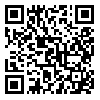Volume 17, Issue 6 (10-2018)
ijdld 2018, 17(6): 300-306 |
Back to browse issues page
Download citation:
BibTeX | RIS | EndNote | Medlars | ProCite | Reference Manager | RefWorks
Send citation to:



BibTeX | RIS | EndNote | Medlars | ProCite | Reference Manager | RefWorks
Send citation to:
Marzban A, Barzegaran M, Delavari S, Marzban H, Rahmanian V. ATTITUDES AND BEHAVIORS OF PEOPLE IN BANDAR-ABBAS CITY ABOUT HERBAL MEDICINE CONSUMPTION IN DIABETES. ijdld 2018; 17 (6) :300-306
URL: http://ijdld.tums.ac.ir/article-1-5723-en.html
URL: http://ijdld.tums.ac.ir/article-1-5723-en.html
ATTITUDES AND BEHAVIORS OF PEOPLE IN BANDAR-ABBAS CITY ABOUT HERBAL MEDICINE CONSUMPTION IN DIABETES
1- Student Research Committee, Shahid Sadoughi University of Medical Sciences, Yazd, Iran.Department of Human Ecology, School of Public Health, Shahid Sadoughi University of Medical Sciences, Yazd, Iran
2- Noncommunicable Diseases Research Center, Fasa University of Medical Sciences, Fasa, Iran
3- Students Research Committee, Alborz University of Medical Sciences, Karaj, Iran
4- Student Research Committee, Hormozgan University of Medical Sciences, Bandar Abbas, Iran
5- Student Research Committee, Shahid Sadoughi University of Medical Sciences, Yazd, Iran.Research Center for Social Determinants of Health, Jahrom University of Medical Sciences, Jahrom, ,vahid.rahmani1392@gmail.com
2- Noncommunicable Diseases Research Center, Fasa University of Medical Sciences, Fasa, Iran
3- Students Research Committee, Alborz University of Medical Sciences, Karaj, Iran
4- Student Research Committee, Hormozgan University of Medical Sciences, Bandar Abbas, Iran
5- Student Research Committee, Shahid Sadoughi University of Medical Sciences, Yazd, Iran.Research Center for Social Determinants of Health, Jahrom University of Medical Sciences, Jahrom, ,
Abstract: (4039 Views)
consumption of medicinal plants, especially when conventional treatments are not able to control diabetes, and the patient needs insulin administration, is remarkable. The aim of this paper is the attitude and social behaviors of Bandar Abbas 's people to consume of herbal medicine in treatment of DM.Methods: This descriptive cross-sectional study was conducted in 2017. In this study, 300 individuals aged 20 to 65 years were selected randomly from 10 locations in Bandar Abbas. The research instrument was a two-part questionnaire that evaluated demographic information and attitude. Data were analyzed by SPSS-24 software using descriptive statistics (mean, standard deviation and frequency), ANOVA, T-test Independent and Chi-Square tests.
Results: The mean and standard deviation of people's attitude toward using herbal drugs in the treatment of diabetes was 47.15±3.23. The mean score of attitude with gender variables (P = 0.002), age (P = 0.04) and education (P = 0.02) was statistically significant. The majority of people had their information on herbal medicines through their parents and relatives, and this difference was statistically significant in distributing the frequency of information sources in individuals. (P = 0.001)
Conclusion: According to the results of this research, people's attitude towards the use of herbal medicines in the treatment of diabetes was at a relatively good level, which can play a constructive role in the scientific and executive planning of the health and medical professions.
Type of Study: Research |
Subject:
Special
Received: 2018/06/14 | Accepted: 2018/11/3 | Published: 2018/10/15
Received: 2018/06/14 | Accepted: 2018/11/3 | Published: 2018/10/15
Send email to the article author
| Rights and permissions | |
 |
This work is licensed under a Creative Commons Attribution-NonCommercial 4.0 International License. |





